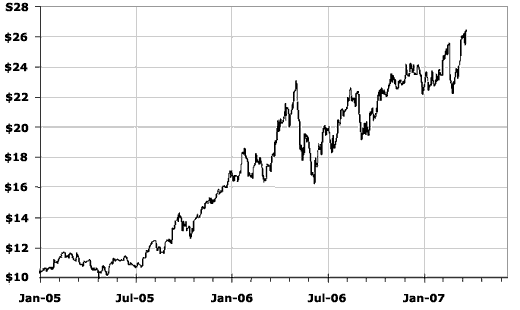| Home | About Us | Resources | Archive | Free Reports | Market Window |
The Diamond Cartel is Finally BrokenBy
Tuesday, April 3, 2007
Most people think that the price of diamonds is artificially controlled by DeBeers. The old wives' tale is: "DeBeers has an infinite stockpile in Africa." The actual truth is DeBeers' stockpile is gone. DeBeers is down to "working stock." And there isn't an enormous stockpile out there anywhere. It's closer to the opposite... and in the next few years, the diamond industry will face a supply crunch. The demand is coming from everywhere... in Shanghai, for example, eight out of 10 brides receive a diamond for their wedding, up from three out of 10 brides in 1997. Supply won't be able to keep up with demand, and when that happens, diamond prices will go up – it's Economics 101. DeBeers simply changed its strategy. It no longer tries to control the supply of diamonds, as it turns out it just wasn't good business in the 1990s. DeBeers is now concentrating on selling diamonds and investing heavily to find more diamonds, particularly in Canada. Most people don't know it, but DeBeers is not a secretive private company. DeBeers is actually 45% owned by a little-known public company called Anglo American, which I recommended to True Wealth readers back in January 2006. The shares have risen from around $17 back then to new highs around $27 today. Anglo American shares -
There is more to come... You may not have heard of Anglo American before. But it is a monster... The company earned $10 billion dollars in profit before tax in 2006. It's so big, DeBeers produces nearly half of the world's diamonds, yet it only makes up a tiny slice of Anglo American's earnings. In addition to ruling the diamond market, Anglo American dominates the platinum market, contributing 40% of the world's platinum production. As with diamonds, Anglo American's massive platinum operations only make up a small fraction of its earnings. This is one big company. The biggest contributor to Anglo American's earnings is its base metals operation – including copper, nickel, and zinc. The metals Anglo American produces have obviously soared in price over the last few years. When I looked into Anglo American back in late 2005, I found just what I wanted... Nobody on Wall Street really covers it. Independent research firm Morningstar covered the stock back then... and it had a "sell" rating on it. (Morningstar praised the company, but in the end said it don't believe in commodities: "We expect commodity prices will revert toward their historical long-term averages. Our fair value estimate... is predicated upon this pricing revision.") I told my readers in the January 2006 issue of True Wealth: “The stock is really cheap. The business has always been very profitable, even in the bad times for commodities. And yet nobody knows anything about it. If you type it up on Yahoo! Finance, nothing shows up. Yet it's a massive $50 billion business.” “Analysts hate it, the general public has never heard of it, and yet the uptrend is finally in place. It's just what we want to see... Buy Anglo American (Nasdaq: AAUK) today, and plan on holding it for the next 10 years.” Anglo American was a buy back in January 2006. And it remains a buy today. It is the very best way to own the entire commodities market in one stock, for the long run. Good investing, Steve
Market NotesPRICES ARE DOWN, BUT IT'S STILL BOOM TIMES FOR AAUK Shares of Anglo American (AAUK) are up 30% in the past year. Meanwhile, commodity prices in general haven't done much but move sideways. So what's the reason for the outstanding performance of AAUK and its competitors? As you can see from the five-year chart of the benchmark CRB Index, commodities in general are significantly off their 2006 highs. However, you can also note that prices remain more than 50% higher than their levels of five years ago. This long-term price increase makes for extraordinary profits in the commodity production business. Anglo American, for example, increased earnings by 46% last year and conducted an enormous stock buyback program of $7.5 billion. Sure, commodity prices could weaken further, but baring a complete collapse, the Anglo Americans of the world stand to make another killing in 2007. |
Recent Articles
|


